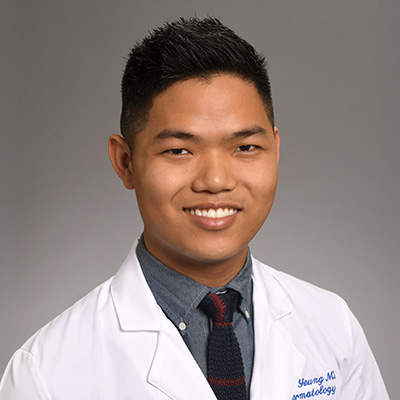
June 2024: Howa Yeung, MD, MSc
Assistant Professor of Dermatology
Emory University School of Medicine Dr. Howa Yeung, MD MSc, is an Assistant Professor of Dermatology at the Emory University School of Medicine. His research focuses on understanding, preventing, and treating skin diseases that disproportionately impact LGBTQ+ populations, such as 1) acne in transgender and gender diverse individuals and 2) skin cancers in gay and bisexual men and persons with HIV. He completed an accelerated BS/MD program at the Sophie Davis School of Biomedical Education program, graduating with a BS, summa cum laude, from the City College of New York and an MD from New York University School of Medicine. He completed dermatology residency and an MSc in Clinical Research at Emory University. He is a World Professional Association for Transgender Health Standards of Care Version 8 certified member. He has published >100 peer-reviewed articles and serves as an Associate Editor of JAMA Dermatology. |
Q: What are your current research interests?
A: My background – as an immigrant, Asian American, gay man raised by a working-class family that struggled to access health care in New York City -- motivated me to address health equity in underserved communities. In college, I studied how patient navigators can help racial/ethnic minority patients stop tobacco use (U54 CA137788). In medical school, I studied the effect of psoriasis on cardiometabolic outcomes in a dermato-epidemiology research fellowship at the University of Pennsylvania (T32 AR007465). After my dermatology residency at Emory, I pursued an MSc in Clinical Research (KL2 TR002381) to study skin cancer risk in MSM and persons with HIV. Now, I apply these experiences to studying acne in transgender persons. |
Q: Tell us about your career path – how did you end up where you are now?
A: I am interested in how acne and other hormonal skin diseases develop in transgender and gender diverse persons during gender-affirming testosterone therapy.Our research (K23 AR075888) shows that acne in transgender persons is common, persistent, and impactful to mental health. We are engaging transgender and gender diverse persons and communities to develop a longitudinal cohort on the natural history and treatment of testosterone-induced acne. In understanding testosterone-induced acne during this “second puberty,” as a bonus, I hope we can also spark ideas on how hormones affect the skin and how to address acne in endogenous puberty. |
Q: What organizational challenges have you faced?
A: LGBTQ+ skin health did not exist as a field. Historically, LGBTQ+ health focused on HIV, STI, mental health, and substance use. I had to convince many colleagues and institutional leaders of how skin diseases impact LGBTQ+ health and the importance of health equity in dermatology. As LGBTQ+ health research continued to expand in scope, I found the courage to submit my K23 grant after attending the Building the Next Generation of Academic Physicians (BNGAP) LGBT Health Workforce Conference and finding valuable resources and workshops from NIH SGMRO. Fortunately, NIAMS funded it, one of the first grants to focus on SGM skin health. |
Q: What advice do you have for trainees and researchers who want to work in this area or are interested in applying for NIH funding?
A: Finding the right people is vital. I am grateful to the kind, thoughtful, brave, and generous mentors who supported me for who I am and what I wanted to do: Suephy Chen, Joel Gelfand, Junko Takeshita, Bob Swerlick, Eleni Linos, David Margolis, Vin Tangpricha, Cam Escoffery, Jonathan Weiss, and so many others. They helped me question dogma, hone ideas, push research boundaries, navigate academia, build resilience, and find my professional tribe. They answered my calls asking for help, listened to my challenges, and provided encouragement and reassurance. I am also grateful for my collaborators and trainees who energize me to continue growing. Always continue to listen, learn, and evolve! |
Q: Do you have any specific advice for working with and involving SGM populations in research?
A: Partnering with LGBTQ+ communities warrants researchers’ time, budget, resources, and expertise. Listening to community members’ lived experiences and concerns will enrich your research, build further collaborations, and help structure your priorities. Also, mentoring, hiring, and supporting LGBTQ+ researchers are critical to sustaining SGM health equity research. SGM health has made tremendous strides over the last few decades, but we must expand the pipeline of researchers to continue the progress. |
Q: Who inspires you?
A: Immigrants, like my parents, who forged new futures for their families through hope, grit, and love. Community advocates who fought to be seen and heard and for SGM health to exist. Clinicians, scientists, and public health professionals who strive to keep people healthy regardless of backlash, especially during the HIV and COVID-19 pandemics. |
Q: Any final words of wisdom?
A: When we submit a grant, our lab celebrates with a mini bottle of champagne wrapped in the Specific Aims page. However you celebrate, take a moment to reflect on your accomplishments and acknowledge your colleagues. Those moments will propel you to keep dreaming and achieving! |
